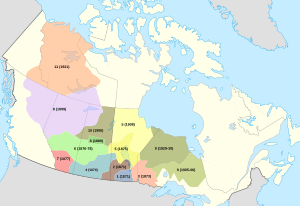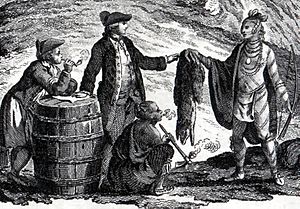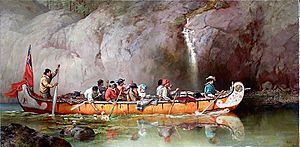Michel Band facts for kids
| People | Iroquois / Cree / Métis people |
|---|---|
| Headquarters | Calihoo, Alberta |
| Province | Alberta |
| Land | |
| Reserve(s) |
none
|
| (1998) | |
The Michel Band is an Indigenous group from central Alberta, Canada. The Canadian government recognized them as a nation and treaty partner from 1878 to 1958. Today, the people who are descendants of this historic band are known as the Michel First Nation. They are working through legal and political actions to be recognized again by the government.
The Michel Band was also known by names like Michel Caillehoo or Michel Calihoo. These names came from their chief at the time, Michel Calihoo. He signed Treaty 6 with the Canadian government on September 3, 1878.
In 1880, a reserve was set aside for the band. It was called "Michel I.R. 132" and was about 40 square miles (100 square kilometers) in size. This land was located on the Sturgeon River, near St. Albert, Alberta, northwest of Edmonton.
Like other First Nations in the Edmonton area, the Michel Band faced pressure to give up their farming land. Over many years, land sales, sometimes involving government corruption, reduced their land. In 1958, the entire band was "enfranchised." This meant they lost their official "Indian status" under the Indian Act. In exchange, they gained the right to vote in Canadian elections. The Michel Band was the only First Nation in Canada to be enfranchised in this way during the 20th century.
The people of the modern-day Michel First Nation have family roots mainly from the Iroquois, Cree, and Métis groups. In 1998, there were over 700 registered descendants.
History of the Michel First Nation
The Michel Band was made up of Iroquois people and their leader, known as "Yellowhead." They traveled from eastern Canada to Alberta. Yellowhead was rumored to be connected to the French royal family. He believed he needed to leave the east to avoid danger during the French Revolution.
When Yellowhead arrived in St. Albert, Alberta, he asked Father Lacombe for help finding a home for his people. The Michel Reserve, north of St. Albert, became their land. Many band members gave up their reserve and treaty rights when Alberta became a province in 1905. This was because their traditional Iroquois government style involved voting. When the government said Indigenous people on reserves could not vote, many Michel Band members moved to St. Albert so they could vote.
In 1958, the Michel Band became the only First Nation in Canada during the 20th century to be enfranchised.
In 1985, many descendants of the Michel Band regained their Indian status through a new law called Bill C-31. Since then, they have been asking the Canadian government to recognize them again as an Indian band with Aboriginal and treaty rights.
Many Michel Band members trace their family history to Louis Callihoo. His original Iroquois name was Kara Komptee or Kwarakwante, and he was also called "Yellowhead." He was Mohawk, part of the Iroquois confederacy, born in 1782 in Kahnawake, Quebec. He was known as "Le Soleil Voyageur," which means "The Sun Traveller." This might refer to his rumored connection to the French king, Louis XIV of France, known as "the Sun King."
In 1800, Louis Kwarkwante, or Yellowhead, became a fur trader with the North West Company. He traveled west from Montreal to Northern Alberta. He married three local women: a Sekani woman and two French-Cree Métis sisters. The band's language was likely Michif, a mix of Cree and French, by the late 1800s.
The Michel Band developed as a unique group during the North American fur trade.
Louis Kwarakwante and the Fur Trade
Louis Kwarakwante ("The Sun Traveller") was born in 1782 near a Catholic Mission in Quebec. He was likely Mohawk. His name "Kwarakwante" might be a mistranslation of "Garakontie." Records show his last name as "Karaconti" or "Callihoo." "Callihoo" comes from "Karhioo," meaning "Tall Forest" in Iroquois. Many of his family members who went west for the fur trade were given the name Karakontie by the clergy. Louis Kwarakwante was likely a grandson of Daniel Garacontié.
Around 1800, the North West Company started hiring Iroquois voyageurs. These voyageurs were skilled canoe paddlers and traders. People like Colin Robertson, a fur trader, preferred Iroquois voyageurs because they were calm and quick-thinking in dangerous river crossings.
Iroquois voyageurs were known for being strong, reliable, and caring for their canoes. They were hired not only for their experience but also because they were familiar with the Catholic Church and the land systems in the Missions. In these Missions, Louis Callihoo learned his catechism and prayers in his native language. He also spoke French and other languages, which helped him in his trading work. He began working as a canoeman for the North West Company in 1800.
The Fight for Recognition
The Michel First Nation continues to seek full recognition. Chief Rosalind Callihoo, a descendant of Michel Callihoo, spoke to the Indigenous and Northern Affairs Committee in 2008. She explained that over 700 members of the Michel First Nation had regained their status under Bill C-31. However, many others could not because the law only helped individuals, not entire bands that were enfranchised.
Chief Callihoo highlighted that the Michel First Nation faces discrimination. In 1998, the Indian Claims Commission suggested Canada should allow the Michel First Nation to file a specific claim. But in 2002, the Minister of Indian Affairs refused this.
The Michel First Nation wants the definition of "First Nation" in Canadian law to include groups like theirs. They argue that they should be recognized as a band, and Canada should not benefit from its past actions that took away their status. They want equal access to legal processes to address their historical issues.
 | Frances Mary Albrier |
 | Whitney Young |
 | Muhammad Ali |




